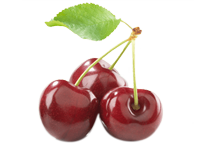Kirsch

Brandy made from cherries is known as Kirschwasser or simply Kirsch. The most famous Kirsch comes from the Alsatian-Loren, Daubs (Mouthiers), Brittany or other regions of France, Germany or Switzerland.
Any type of cherry may be used to obtain Kirsch but not all will yield the same quantity nor the same quality in regards to flavour. The small black cherry will produce a more aromatic and rich Kirsch while brandy made from red cherries will not be as rich as these cherries do not contain the same quantity of sugar or aromatic elements. The cherries should only be picked when they are completely ripe so that they may be sweet and contain the highest level of sugar possible as this will produce a higher level of alcohol. All leaves and stems should be removed as these may influence and alter the taste of the Kirsch making it bitter. The cherries should be crushed with a wood press similar to that used to crush grapes.
It is quite interesting to know that when a press is not available men use wood clogs and crush the cherries with their feet in large vats. Care should be taken not to crush the pit in order to obtain clearer finer Kirsch. The crushed cherries are then left in vats or recipients to ferment.
Just like grapes, these will start to ferment naturally and so there is no need to add a leavening agent. However, fermentation may take quite a while to start and it may not be strong enough to decompose all the sugar contents. During this waiting period the crushed cherries may experience various alterations, some of the crushed matter may actually begin to rot and influence the rest of the batch by leaving a horrible taste. To avoid such inconveniences, it is wise to add an activator which is prepared in the following manner:
Boil the mixture and let cool until it reaches a temperature between 20° to 25ºC. Some leavening agents used to make wine (available in shops) should then be added to this mixture. Fermentation will start approximately 24 hours later.
Make sure the liquid is well aired and mixed several times to encourage fermentation. In 5 days time you will have enough liquid to ferment 8 to 10 hectolitres of must. This fermenting liquid (yeast) is poured into the vats that contain the cherry must. Beer yeast may also be used but the quality of the brandy will not be as good. Cherry must ferments quite rapidly once it has commenced therefore if no yeast was added fermentation will take 15 to 20 days to be complete and 8 to 10 days with the help of the yeast.
Only copper alembics should be used to distil Kirsch. You may use a normal alembic, distil with steam distillation or use the bain-marie alembic. Take care to separate the heads which are very sour and improper for human consumption (see Basic Distillation Rules). The liquid that comes out next will have 50 to 55% alcohol, this is the Kirsch. You will continue to obtain kirsch until 40%. Below this you are collecting the tails.
With about 100 kilos of cherries (without stems) and a good fermentation you should yield approximately 12 to 15 litres of Kirsch at about 51%.
Kirsch should remain colourless and should not be stored in wood barrels like cognac but in glass bottles.

